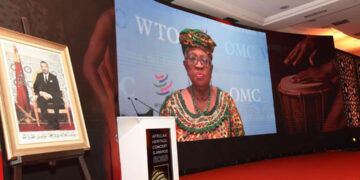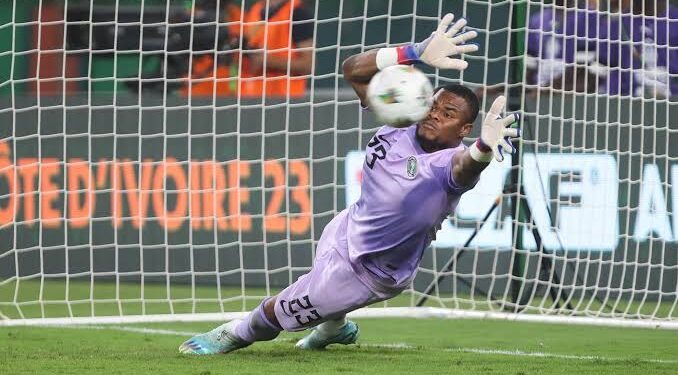By Victor Kanayo
Perhaps, no one knew he will ever come this good, but as fate may have it, now revered goalkeeper Stanley Nwabali has become the stone builders rejected, who has surprisingly turned out to spring forth as the Chief corner stone.
His reflexes and prowess have indeed combined to give Nigeria’s Super Eagles a tonic to hope for in the ongoing 2023 Africa Cup of Nations which certainly comes to an end on Sunday, February 11, 2024.
Heritage Times HT still providing non-stop insight concerning the 34th AFCON recalls that Nwabali only became an irresistable option after first choice hand Francis Uzoho faltered repeatedly in the past.
Before Nwabali’s sudden career explosion, he wasn’t anyone to reckon with.
More so, the goalkeeping crisis has bedeviled the Super Eagles since July 2017, when Carl Ikeme was diagnosed with acute Leukemia.
Only in July 2021, the huge, tall and hefty goalkeeper conceded four goals against Mexico on his Super Eagles debut in a friendly in the USA.
Later on, he focused on his club career and moved to South Africa.
“The feedback I got when I wanted to work with him was not great. Many said he was notorious for time-wasting tactics.
“But I fell in love with his imposing physique, ball-playing technique and most importantly, his business-like attitude. He was raw, like many players from the NPFL, where coaching could be a lot better and more attention ought to be paid to details.
“But he is hungry and committed to succeed. He is coming from a very humble beginning and he is focused on changing the lives of all those around him.
“The Super Eagles and the AFCON are very big platforms and Nwabali has used them to his advantage,” Mohammed Lawal, Nwabali’s agent said while reacting to Super Eagles newly-found form.
As it were, the 27-year-old Chippa United No 1 has made 14 saves, posted four clean sheets in six matches leading up to the biggest game in African football.
So far at AFCON, Nwabali has saved two of South Africa’s kicks in the penalty shootout in the semi-final as well as pulled off game-defining saves against Angola, Cote d’Ivoire and Bafana Bafana in regulation and extra time.
Nigeria’s Super Eagles Flight To Final
From beginning, the Nigeria Super Eagles were drawn in Group A alongside the host Cote D’Ivoire, Equatorial Guinea, and Guinea-Bissau.
The team turtored by Portuguese Jose Peseiro kicked of its AFCON campaign with a 1-1 draw against Equatorial Guinea. Victor Osimhen header canceled out Salvador’s goal within 2 mins of conceding.
Nigeria’s second group-stage match was against host Cote D’Ivoire, which they won by a Solitary goal courtesy of a well taken penalty by Nigeria stand in Captain Willams Troost-Ekong after Victor Osimhen was brought down in the box.
Their final group game was also One nil victory over Guinea-Bissau via an own goal, who had already been sent packing from the competition.
In the end, Nigeria finished second in the log behind Equatorial Guinea, level on points but with an inferior goal difference.
In the Round of 16, the Super Eagles came up against neighbours and arch-rivals Cameroon. They defeated The Indomitable Lions of Cameroon 2-0 with a superb brace from Ademola Lookman.
READ ALSO: Reopening Of Niger’s Border With Nigeria: X-raying The Economic Implications
The daring Nigerian team then went against the Palancas Negras of Angola in the Quarter-Final, a hard-fought match which they won by a lone goal scored by Ademola Lookman to bring his goal tally to three in the competition.
After defeating Angola, they went up against familiar foes The Banana Bafana of South For a place in the final. A decisive penalty from Kelechi Iheanacho helped the Super Eagles to a 4-2 victory on penalties after the game ended 1-1 after regulation and extra time with penalty goals from Williams Troost Ekong and Teboho Mokeona to set up a date with the host Nation the Elephants of Cote D’Ivoire in the Final.
Elephants Stroll To End Point
Being the host, the Elephants of Cote D’Ivoire began their Group A campaign with a 2-0 win against Guinea-Bissau with goals from Seko Fofana and Jean-Philippe Krasso in each halves.
They went on to play Nigeria in their second match and lost by a lone goal.
Their loss to Nigeria put pressure on the Ivorians knowing that anything other than a win against Equatorial Guinea in the last group-stage, would give them no chance to qualify automatically for the round of 16.
Eventually, the Thunder of Equatorial Guinea thrashed the Ivorians 4-0 which meant they had to rely on other results elsewhere. Luckily a draw for Ghana against Mozambique meant the Ivorian would sneak through as the 4th on the best loser table with 3 points and qualify for the round of 16.
During knockout, they came up against the defending champions The Terenga Lions of Senegal, where they conceded a third-minute goal courtesy of Habib Diallo. They stayed in the game until 85 minutes as Nicolas Pepe won a penalty which was converted by Frank Kessie. The match went into extra time and then a penalty shootout, which was where the Elephants prevailed 4-5 with Frank Kessie scoring the decisive penalty to set up a meeting with Mali in the Quarter-Finals.
The Elephants booked their place in the semi-final, courtesy of a 2-1 win over the Eagles of Mali after 120 minutes of football with Oumar Diakite scoring the decisive goal in the last kick of extra time to send the crowd into frenzy. Nene Dorgeles had given Mali the Lead only to be pecked back at the stroke of full-time by Simon Adingra.
Then, Cote d’ivoire defeated the Leopards of DR Congo 1-0 via a looping volley in the 65th minute by Sebastian Haller to set up a repeat of the second game of the group stage against Nigeria in the final.
At the moment, the tension is raging for both sides with pretty AFCON previous records.
What The Records Say About Both Nations
According to statistics, Côte d’Ivoire are yet to beat Nigeria at AFCON since the 2008 group stages, a 1-0 win.
Both West African countries are meeting for the eighth time at the Africa Cup of Nations (three wins for Nigeria, two for Côte d’Ivoire D2), including in all three AFCON editions where the Super Eagles have won the competition (group stage draw in 1980, a 4-2 Nigeria win on penalties after a 2-2 semi-final draw in 1994 and a 2-1 Nigeria win in the quarter-finals in 2013).
Following their 1-0 win in the group stages over Côte d’Ivoire, Nigeria will be looking to beat the same nation twice in a CAF Africa Cup of Nations tournament for the first time since 2006, when they beat Senegal in the group stage and third-place playoff.
Côte d’Ivoire are the first host nation to reach the CAF Africa Cup of Nations final since Egypt in 2006, who won the trophy that year on penalties against Côte d’Ivoire after a 0-0 draw. Five of the last six host nations to reach the final have won the tournament, the exception being Nigeria in 2000 (drew 2-2 with Cameroon, lost 4-3 on penalties).
However, Nigeria are playing in their eighth Africa Cup of Nations final, only Egypt and Ghana (both 9) have played in more of such games in the competition (excluding final groups). The Super Eagles have been victorious in two of their last three (1994 and 2013, lost on penalties in 2000) having lost their three beforehand (1984, 1988 and 1990).
All four of Côte d’Ivoire’s previous CAF Africa Cup of Nations finals have ended goalless and gone to penalties – they won two of those shootouts (1992 and 2015, both vs Ghana) and lost two (2006 vs Egypt and 2012 vs Zambia).
And they have have won 17 of their last 18 matches at the CAF Africa Cup of Nations when scoring the first goal (D1) – their last such defeat was in the 2010 quarter-final against Algeria, losing 3-2.
In any case, Nigeria are unbeaten in 22 AFCON games when scoring first (W19 D3) since a 3-1 loss to Egypt in 2010.
The two most common scorelines in CAF Africa Cup of Nations finals are 1-0 (eight times) and 0-0 (seven times) – since 2002, nine of the 11 finals have ended in one of those scorelines, with the other two 2-1 wins for Tunisia in 2004 and Cameroon in 2017.
Since the last time they conceded three goals in a CAF Africa Cup of Nations match (1-3 vs Egypt in 2010), Nigeria have only conceded 16 goals in 28 games at AFCON (0.57 per game). Only eight of those 16 goals have come in open play, including just one at this year’s tournament.
Let the beat go on.

































